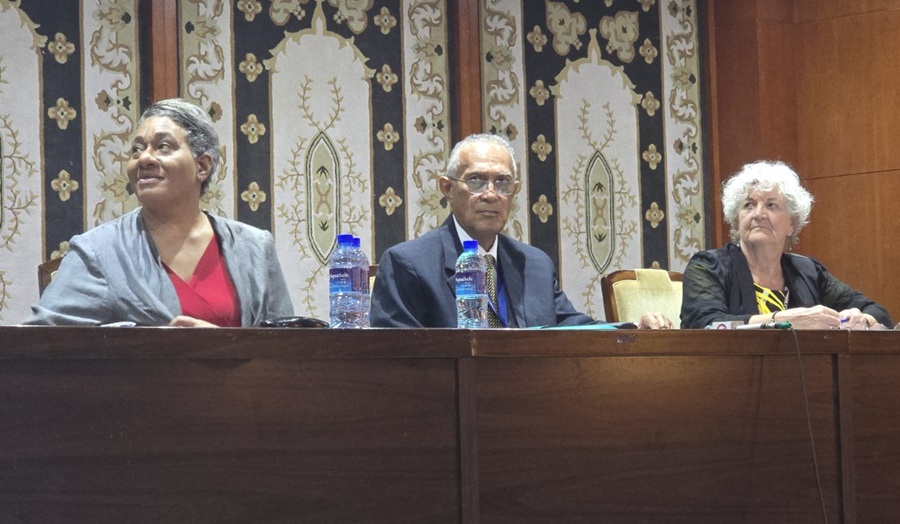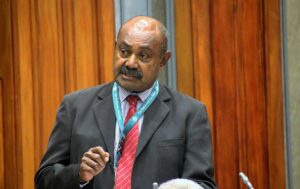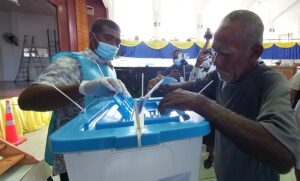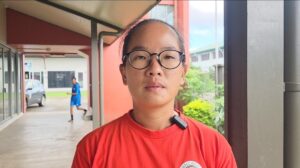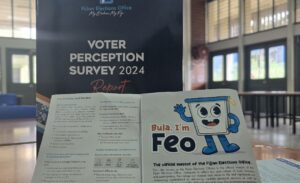Women’s voices took centre stage on the first day of public submissions for Fiji’s Electoral Law consultation, with calls for affirmative action—including gender quotas—coming from several participants determined to see more women represented in Parliament.
Among them was seasoned politician and National Federation Party (NFP) representative Priscilla Singh, who didn’t mince her words.
“In a society like ours where patriarchy is still intact, no matter what people say—women don’t get in. And we need that affirmative action,” said Singh, reflecting on nearly three decades of political experience.

She said allocating reserved seats for women would be a good starting point to level the playing field.
“We can reserve seats for women temporarily and phase it out when we reach 30% or 50%.
“Women don’t have the OBs [Old Boys] network. They don’t have the connections—but that doesn’t mean they can’t contribute,” Singh said. “We have a lot of intelligent and able women who can go into Parliament and make a difference.”
Other women echoed Singh’s call during the Suva consultations, including Elizabeth Reade Fong, President of Counter Stroke Fiji and a member of the Electoral Disability Awareness Group. Fong urged the Electoral Commission to consider Samoa’s Temporary Special Measures (TSM).
Samoa’s 10% law, introduced before its 2016 elections, ensures a minimum of five women MPs in Parliament. If fewer than five are elected, additional seats are allocated to the highest-polling female candidates. Unlike fixed quotas, Samoa’s system activates only when the target is not met, without reserving seats outright or requiring party-level gender balances.

“There should be more women in Parliament. How can the numbers be increased? By quotas,” Fong said. “That’s the way to overcome the patriarchy that exists. We hold up half the skies—why shouldn’t we be in there? And because of how the systems are, we need to put quotas in place.”
Retired teacher Kini Weleilakeba also shared her perspective, arguing that women’s everyday roles in homes and communities already demonstrate the leadership skills needed in Parliament.

“Women—whether they like it or not—are managers of their home: financial managers, all kinds of managers—which a lot of men and young boys take for granted,” she said. “We have all these valuable skills that have been ignored. I think it’s time we correct that.”
However, not all submissions supported the idea of quotas. Viliame Takayawa, General Secretary of SODELPA—one of the parties in Fiji’s Coalition Government—said that while they support increased female participation in leadership, they believe reserved seats “may promote tokenism rather than genuine inclusion.”
Instead, SODELPA recommends women’s empowerment through party policies, leadership training, and civic education.

“Create enabling environments that support women’s candidacy and leadership development,” Takayawa said.
Adding a youth voice to the conversation, medical student Nitish Sharma—who was the youngest candidate in the 2022 General Election under the We Unite Fiji party—acknowledged the need for more women in Parliament but expressed caution about quotas as a long-term strategy.
“I’m sad that we don’t have enough women in Parliament right now. The quota system can be looked into in the short term but not as a long-term solution. Change should be a cultural one. The population should be the ones voting in women.

“Quotas can be problematic at some point. Once you have a quota for women, then you have to have quotas for youths, for older people, for Indo-Fijians—quotas, quotas, quotas—when do you stop? Yes, we can look into it, but I believe the culture is what needs to be changed.”
His comments come against the backdrop of declining female participation in politics.
Despite more women than men turning out to vote in the 2022 General Election, female representation in Parliament remains low. Of the 345,240 women registered, 238,389 voted—but only six out of 54 female candidates were elected, making up just 11% of Parliament. Women received only 8% of the total votes.
In 2014, women made up 18% of candidates (44 out of 248), with eight elected (16%) and 13% of the vote. In 2018, women comprised 24% of candidates (56 out of 235), with 10 elected (20%)—but again, only 8% of the overall vote went to women.
Consultations on the three electoral laws – Electoral Act 2014, Political Parties (Registration, Conduct, Funding and Disclosures) Act 2013m and the Electoral (Registration of Voters) Act 2012 – continue today from 10am to 2pm at the Police Bure in Korovou and from 4pm to 6pm at the Nausori Market.
Headed by retired Judge Justice Daniel Fatiaki, the review will assess the existing electoral laws with relevant sections of the 2013 Constitution, and recommend necessary changes.
Public consultations will continue until May 9.
Interested persons or institutions are also encouraged to make written submissions with recommendations for review or reform through the following methods:
- Online Portal submissions on the FLRC website at https://flrc.gov.f/submission-form/
- Email at fijilawreformc@gmail.com
- Hand-delivered submissions at the FLRC Office, Level 5 Civic Tower Suva (located behind the Suva City Library).
- Post at Fiji Law Reform Commission, P.O Box 2519, Government Buildings, Suva
Please note that all written submissions should specify the subject as “FLRC Electoral Law Reform”

